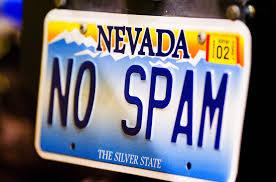A love letter to the tech marketers who buy my contact information.

The longer-term answer: Polish that marketerd
Before I give any marketing advice, let me just say that I'm not a marketer. I had other options in life.
That said, I'm of the Fred Wilson school of marketing, which boils down to "build products that don't suck." How? The Steve Blank school of product development: Start with a customer, not a product. It's not about the damn product. Sale No. 2 should come from a rabid introduction from customer No. 1.
Still not making sense? One last clue: Tony Hsieh of Zappos fame doesn't actually cobble shoes. It's not about building the product; it's about creating the culture that produces evangelists, internally and externally. Note that unlike with Fred and Steve, I didn't link to Tony's writing. The lesson there is that sometimes books can feel like chloroform.
If there's a theme here, it's 1) read a non-marketing book every once in awhile; and 2) assume that the best way to transform a process is to transform its adjacencies.
You know this: Your sales and marketing teams are actually everyone in your entire company. Act accordingly. Hire people who leverage their creativity and their networks on your company's behalf. Apply what you've learned from social.
Here's how I explain old-school salesmanship to the social generation. Back in the day, when grandpa hired a really great salesman, he was actually paying for that person's Rolodex (a social network made of cardboard). That salesman would systematically reach out to all the businesspeople he'd ever met (anyone who'd ever given him a "like"), and he'd use his phone or face-to-face meetings to "tweet" how impressed he was with grandpa's company/product. What grandpa was really paying for was the salesman's willingness to exert his social influence (his Klout Score) on behalf of grandpa's company/product.
You know how Facebook's real product is you? Well, if you work at a company, a variation of that rule applies. You're its product. So when you spam, that's the company's product. And it's nearly impossible to look past that fact.
If you're not personally guilty but you do work at this kind of company, start a conversation and persist until it changes its practices. I certainly press on it at Big. Our entire industry is still sending unsolicited snail mail by the truckload. Snail mail! Tiny countries worth of trees! So when it comes to choosing between opt-in and opt-out strategies, outspoken is my middle name.
Should your company continue to market via email? Absolutely. People who actively opt-in to receive content actually consume it. But don't let them confuse the question of email's effectiveness with the ethics of non-consensual marketing.
If you're directly responsible for the "Hello Coverlet" notes that I receive, take all that money and effort you're putting into hiding in my virtual bushes and instead invest it in building a company culture that doesn't suck.
Your love is like a fever
I use an app called Clear to keep a list of my favorite spammy transgressions. True to my New York state of mind, I call the list "Aggressive Panhandling."
My recent favorites are 1) the guy who asked for a read receipt on his third "why aren't you answering my note" email; and 2) my proof that there's no war on Christmas: all of the spamilicious greetings I got last month. Nothing -- and I mean nothing! -- follows "Merry Christmas Coverlet" quite as joyously as a note about the mysterious power of Hadoop.
I almost cried.
To be fair, I'm not sure I need a list of transgressions given that they're all burnt into my psyche, but Clear is brilliant: minimalist in design and fun to use. I'll never get a marketing email from the app's makers because they don't need the hard sell.
They had me before hello.
The author, a senior IT executive at one of the nation's largest banks, shares his experiences under the pseudonym Coverlet Meshing. He has spent the last two decades in the financial services sector, picking a fight with anyone who doesn't understand that banks are actually software companies and need to invest in engineering as a core competency. His cheery outlook and diplomatic nature are rarely reflected in his writing. Write to him at [email protected]. Follow him on Twitter: @CoverletMeshing.
InformationWeek Conference is an exclusive two-day event taking place at Interop where you will join fellow technology leaders and CIOs for a packed schedule with learning, information sharing, professional networking, and celebration. Come learn from each other and honor the nation's leading digital businesses at our InformationWeek Elite 100 Awards Ceremony and Gala. You can find out more information and register here. In Las Vegas, March 31 to April 1, 2014.
About the Author(s)
You May Also Like







